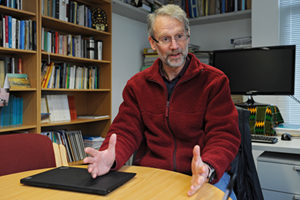Leibbrandt brings new life to PII
26 August 2013 Prof Murray Leibbrandt, the new head of the Poverty and Inequality Initiative (PII)
Prof Murray Leibbrandt, the new head of the Poverty and Inequality Initiative (PII)
Fresh face at the helm of the innovative Poverty and Inequality Initiative
Earlier this month, Professor Murray Leibbrandt was appointed as the pro-vice-chancellor of PII. He spoke to Helen Swingler.
HS: What was it about the position that made you think: 'This is for me'?
ML: The initiative's objective is to maximise the university's collective contribution in the crucial areas of poverty and inequality alleviation. The academic community within UCT is doing a lot of excellent work. The idea of ensuring that the country gets the maximum benefit from this work is a very appealing to me. The talented and committed group I've been working with in the SALDRU [Southern Africa Labour and Development Unit] for the past decade has taught me that it requires commitment to do policy engagement - but that such processes increase the usefulness of our research.
HS: What do you bring to the position and what would you like to add?
ML: SALDRU was started in the mid-1970s by Francis Wilson, with a strong research mission to provide evidence to inform policy. I'm very fortunate to have become part of this 'hard heads and soft hearts' tradition, and there are many in the UCT community on the same mission. UCT has been doing evidence-based policy research for a long time. Since 2008 this has been my core research agenda as the DST/NRF Chair in Poverty and Inequality Research. So I'm committed to representing this tradition, and I am keen to brand and sharpen UCT's collective contribution.
HS: What do you think will be the toughest part of the job?
ML: One of our strengths as a research university is that we focus our energies on doing our work as well as we can within our narrow spheres of excellence. However, this has two negative consequences. First, we seldom step into the policy sphere by clearly communicating the implications of our work for policy. Second, we don't take stock of and communicate our collective contribution. To do better, the research community needs a supportive communications infrastructure. The university has committed resources to putting this infrastructure in place to facilitate communication and policy engagement.
HS: Does it help that you have an already established career in UCT's School of Economics?
ML: Yes, the work we hope to do flows very clearly from where I've come from. I came to UCT in 1994, the year that SALDRU released the national living standards survey it had produced for the incoming ANC government. Along with others in the School of Economics, such as Haroon Bhorat and Ingrid Woolard, I've been working on poverty and inequality issues using such data ever since then. From 2007 Ingrid and I have run the National Income Dynamics Project, a survey that's been tracking the same nationally representative group of South Africans over time since 2008.
HS: On a practical level, will you be moving office? What kind of support system will you have?
ML: No, I won't be moving. The idea is to build a strong administrative hub for the internal and external components of the PII out of the environment within which we've been working. UCT is resourcing this hub. This approach makes sense, because the aim is not to tell UCT or national researchers what to do, but to support the contributions that they want to make. I'll continue to do my research as the NRF Chair.
HS: The PII was set up at UCT to tackle the question of why inequality deepens despite our being a resource-rich country. Where should we be turning to learn about solutions?
ML: The footprint of our distinctive history is important in understanding contemporary poverty and inequality here. But when it comes to looking at promising policy options, there are many international lessons. Already we are part of an international community that looks to other developing economies to find promising policies to address poverty and inequality. Our policies, for example with regard to social grants, are being considered by other countries, and we are very interested in the international evidence on youth employment policy and the effectiveness of community works programmes. The BRICS countries are a very good place to start.
 This work is licensed under a Creative Commons Attribution-NoDerivatives 4.0 International License.
This work is licensed under a Creative Commons Attribution-NoDerivatives 4.0 International License.
Please view the republishing articles page for more information.










